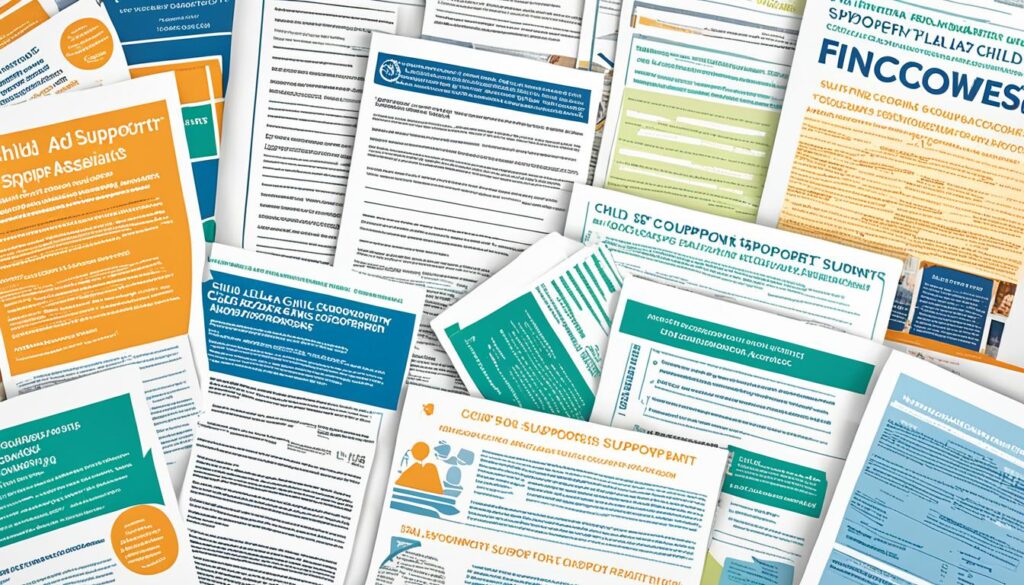As a noncustodial parent, your child’s financial support is crucial. But what if fulfilling this is hard? You might face contempt of court charges for child support, and that’s scary. The big question is, how do you handle this legal challenge while safeguarding your rights and your child’s needs?
It’s vital that children get support to thrive. Yet, unexpected events can make paying child support tough. Losing a job, health problems, or financial woes can lead to big trouble. This includes being accused of contempt of court.
In this guide, I’ll show you steps to take on contempt of court charges for child support. You’ll learn how to work within the legal system, resolving issues for your family. It might sound hard, but going about it the right way can help meet your child support duties without legal problems.
Key Takeaways
- Understanding the definition and consequences of contempt of court for child support
- Importance of hiring an experienced child support attorney to represent your interests
- Providing evidence of financial hardship to the court to demonstrate your inability to pay
- Exploring options for modifying the child support order due to changes in financial circumstances
- Maintaining open communication with the other parent to negotiate temporary payment arrangements
Understanding Contempt of Court for Child Support
Disrespect or disobeying court orders is known as contempt. When child support payments are not made, this can happen. It could get even worse if you miss your court date. The court can be tough on people who don’t pay child support. They might face fines, penalties, or jail time.
Definition of Contempt of Court
Contempt of court means disrespect for the law or the court. If someone doesn’t pay their child support as ordered, this is contempt.
Consequences of Failing to Pay Child Support
Not paying child support has serious legal consequences. It can lead to fines, penalties, or even jail. Losing your driver’s license or job license could also happen. This just makes things harder.
| Consequence | Description |
|---|---|
| Fines and Sanctions | The court can give monetary fines and other penalties for failing to pay. This adds to the financial burden. |
| Jail Time | In severe cases, parents not paying may face jail. This happens when they break court orders directly. |
| Loss of Licenses and Privileges | Not paying means losing your driver’s license or job license. This makes living and working hard. |
Hire an Experienced Child Support Attorney
When you’re accused of not following child support orders, getting a good lawyer is key. A skilled attorney knows your rights well. They also carefully look at your situation and honor your decisions.
Aside from going to court on your behalf, they can talk to the other side. This can lead to solving issues through a peaceful talk.
Importance of Legal Representation
Handling the law can be confusing and even scary, especially with family matters at stake. With a lawyer, you can make sure your rights are safe and you get the chance to speak up in court.
An attorney helps you see what to do next with your case. They guide you on the smartest steps to take in the face of the charges against you.
Benefits of an Attorney
Bringing in a lawyer for child support issues comes with many advantages. They dive into your case, collecting important facts and evidence. They then build a strong plan to defend you.
Moreover, your attorney can also negotiate. They work with the other party and the court for a fair solution. This means looking after your financial interests and what’s best for your child.
Provide Evidence of Financial Hardship
To be held in contempt, the court must show you can pay but choose not to. If you really cannot pay child support due to losing your job, being sick, or facing financial issues, you need to prove it. You can use things like your pay slips, medical papers, or documents from when you were laid off. This is how you show the court you can’t pay child support because of real hardship. It’s important to show the court these documents that prove you are struggling finacially for child support.
| Type of Evidence | Purpose |
|---|---|
| Pay stubs | Demonstrate reduction or loss of income |
| Medical records | Provide proof of health-related financial hardship |
| Unemployment documentation | Show evidence of job loss or inability to find work |
Showing the court your proof of financial hardship for child support helps them see your case clearly. They will understand you’re trying to cope, not just refusing to pay. It’s a key step in not getting in trouble with the court.
Request Modification of Child Support Order
If your money matters have changed a lot since the child support order was first set, you can ask for a change. You need to show proof of your new financial situation. For example, if your income has dropped or your expenses went up, the court needs to know.
Grounds for Modification
The court might change the support order if certain conditions are met. These conditions include the original order being over three years old. Also, the support amount must differ from the standard by 20% or $100. A big change in circumstances must have happened, like a big shift in the paying parent’s income.
Other changes that might qualify include new legal responsibilities for more children and changes in health insurance for the kids. Even a change in where the child lives can be a factor.
Process for Requesting Modification
To ask for a change in the child support order, you have a couple of routes you can take. You can use the Child Support Review Process (CSRP) or opt for a court hearing. Regardless, you will have to prove your financial changes with clear documentation.
The court will review the evidence you present. It will then decide if changing the child support amount is fair. They consider both your needs and your child’s when making their decision.
Maintain Open Communication
It’s best to keep talking with the other parent about child support when you can. If you think you might miss a payment, tell them before it’s due. Try to explain why you’re having trouble. They might work something out with you, or showing this honesty could help if you end up in court.
Talking openly about child support is key when any money issues come up. By sharing your thoughts and staying open, you both show you want to do right by your child. This can lead to fair and positive solutions that put your child’s well-being first.
The court wants to make sure your child gets what they need. By talking things over and working together, you make it more likely to find a good solution. This approach benefits everyone involved, especially your child.

how to beat contempt of court for child support
Avoiding new debts is key if you’re paying child support. Adding debts like car loans makes it tough to pay child support. This can lead to contempt of court. Even if you can’t pay the past due amounts, aim to keep future payments up to date. Doing this shows the court you’re trying to meet your responsibilities.
Avoid Accruing New Debts
It’s vital to not get into more debt if you’re finding it hard to pay child support. More debts, like car loans, add to the challenge. This could lead to contempt charges. Focus on your child’s needs and avoid anything that might stop you from offering financial help.
Demonstrate Good Faith Efforts
If you can’t pay what you already owe, prioritize keeping up with future payments. Making payments regularly shows you’re not avoiding your duties on purpose. This approach can help avoid contempt charges. It shows the court you’re serious about providing for your child as best as you can.
Attend All Court Hearings
One big step in the child support legal process is to show up at all court dates. Missing a hearing can worsen your case and cause more fees. So, it’s very important to be punctual and proper at every meeting. You must let the court know you’re trying to fix things. Being at all your child support court sessions is a big part of that.
Consequences of Missing Child Support Court Dates
Not showing up for a child support court date can lead to serious trouble. It might bring new penalties, like a warrant for your arrest or more court charges. The court is very strict about this. So, always show you’re trying by attending every child support hearing. Make sure to dodge these problems by showing up without fail.
Understanding Child Support Enforcement Proceedings
Enforcing a child support order means knowing the legal steps. The party trying to enforce it must ask the court to find the other party in contempt. They do this by filing a petition with the right court.
Petitioning for Contempt
To start child support enforcement, the court needs a petition for contempt. This step is taken by the parent with custody or with help from the Pennsylvania Child Support Enforcement (CSE). The CSE has several ways to enforce support, like using tax refunds, taking bank money, and possibly fining or jailing a late-paying parent.
Contempt Hearings
After the petition, a hearing is set, where a judge listens to the case. The aim is to see if the non-custodial parent broke the support order. Knowing about these hearings is key for custodial parents wanting to get their unpaid support.
Defenses Against Contempt Charges
When you’re accused of contempt for not paying child support, know that you have rights. You can fight against the charge using various legal defenses. These defenses might help you avoid big punishments like fines or jail time.
Lack of Awareness of Court Order
If you didn’t know about the court order, this can be a defense. It’s crucial that you prove you were unaware of the court order. The court needs to show you intentionally and knowingly disobeyed the order.
Inability to Comply with Order
Sometimes, following a court order isn’t possible, like if a sudden crisis hits. If you can clearly show you couldn’t obey the order despite trying, it can be a valid defense.
Unclear or Ambiguous Order
If the court’s order was unclear or ambiguous, that might help your case. For this defense to work, it must be clear that the order was too vague to follow precisely.
Working with your lawyer, understanding these defenses is important. They offer a way out of a contempt charge if used effectively. With the right help and evidence, you might not have to face serious consequences.
Consequences of Being Found in Contempt
If you ignore a court order or don’t follow it on purpose, you will face serious outcomes. These can include losing your driver’s license, getting fines and sanctions for contempt of court, and even going to jail. You might also lose custody of your child or your professional license. Your bank accounts could be frozen, and your passport taken away. Plus, it can hurt your credit score and lead to more ways to make you follow the court’s orders.
Fines and Sanctions
In California, each act of ignoring a court order can mean fines of up to $1,000 and five days in jail. You could also be ordered to do community service or pay more money. This is all part of the legal fallout in family court for missing court orders.
Jail Time
If you keep refusing a court order, you might end up in jail for contempt of court. In California, if it’s about not supporting your family, the law can still come after you for three years. For other types of court orders, they can act within two years.
Loss of Licenses and Privileges
Being in contempt of court can make you lose driving or professional licenses. This can make it hard to keep a job and pay your bills. This makes the situation even worse. It’s another reason to take court orders seriously.
When dealing with contempt of court for child support, it’s best to get legal help. This can be a difficult legal issue. But, having a lawyer can help a lot. They can show the court if you’re facing financial problems. They can also help find ways to change or fix the court orders. This is a better path than facing the serious outcomes on your own.
Importance of Timely Child Support Payments
It’s crucial to pay child support on time, even if you can’t catch up on past amounts. Making regular, consistent payments shows the court that you take your duties seriously. Remember, the main aim of these orders is to protect the child’s well-being. By keeping up with payments, you’re not only staying out of trouble, but you’re also helping your child.

Child’s Well-being
Child support is mainly about the child’s welfare. Timely payments make sure the child’s essential needs are covered. They also guarantee the child has what they need to grow up healthy. This support, from both parents, is key to a child’s future.
Avoiding Legal Repercussions
Missing child support payments can get you into big legal trouble, like fines, losing your license, and possibly being jailed. Paying on time keeps you away from these issues. It shows you’re serious about your role as a parent. Being prompt with payments keeps the court happy and spares you from more legal problems.
Exploring Alternative Payment Plans
Caught up in child support charges and want a way out? You can explore different payment plans. This might include talking to the other parent or asking for new payment plans from the court. These should match what you can pay now.
Negotiating with the Other Parent
Talking directly with the other parent can be helpful. Try to find a solution without going to court. You might talk about making smaller payments for a while. By working together, you might find a plan that fits both of your needs.
Court-Ordered Payment Plans
If talking isn’t an option, you can ask the court for help. This is especially true if you’ve lost your job or have a big medical bill. You’ll need to show proof and ask for a change in the support payment. The court might agree to a new, fair plan. This keeps you out of trouble while still supporting your child.
Resources for Child Support Assistance
Dealing with the legal system is tough, especially with family involved. A good attorney can guide you, explaining your case and rights. They’ll stand for you in court, making sure your story is heard. Also, look to legal aid organizations and state child support enforcement agencies. They offer help and resources for your child support issues.
Legal Aid Organizations
Legal aid groups are here to help, offering free or low-cost legal support. They can help you know your rights, fill out forms, and even go to court for you on child support issues.
State Child Support Enforcement Agencies
Each U.S. state has a child support enforcement agency to make sure kids get the money they need. They can assist in finding the other parent, proving paternity, and setting up support orders. They also help with enforcing payments if needed.

Conclusion
Facing contempt of court for child support is tough. But, it’s crucial to focus on the child’s well-being first. If you can’t pay, get legal advice and show why. Talk to the other parent with respect. This can help solve problems. Remember, your child’s needs come first.
The key to fighting contempt of court for child support is putting the child’s needs first. Get help from a lawyer and show why you can’t pay. Try to change the order if needed. Talking openly with the other parent is important for working things out well.
Always think about what’s best for your child. Act clearly and work with the law to fix any problems. By working together, you can handle the challenge of contempt of court for child support. This way, you make sure your child gets what they need.
FAQ
What is contempt of court for child support?
Contempt of court happens when someone doesn’t follow a court order, like not paying child support. The court can take big steps, like fines, sanctions, or even jail, to make you obey a child support order.
What are the consequences of failing to pay child support?
Not paying child support can mean you lose your driver’s license, face fines or jail, and lose custody rights. You might also lose professional licenses, have your bank accounts frozen, or your passport taken. It can hurt your credit too. The court can also use other ways to make you pay.
Why is it important to have an experienced child support attorney?
A good child support attorney can explain your rights and defend you in court. They help make sure your side is heard. They also negotiate with the other party for you.
How can I provide evidence of financial hardship?
To show you are struggling financially, present things like pay stubs, medical records, or proof you lost your job. This helps prove you can’t pay child support because of issues out of your control.
How can I request a modification of the child support order?
You can ask for a child support order change if your situation has drastically changed. Offer proof and the court might lower your payments, based on your new circumstances.
How can open communication help with child support issues?
Talking openly with the other parent can be helpful. If you know you might miss a payment, talk to them. Try to find a short-term solution without involving the court. This shows you’re trying to do the right thing.
How can I avoid accruing new debts while paying child support?
Don’t take on new debts while paying child support. More debt makes it harder to pay what you owe for your child. This could lead to more legal trouble.
What happens if I miss a court date for child support?
Missing a court date is serious. It can lead to more problems. Showing up for all court dates and acting responsibly in court shows you’re serious about fixing the issue.
What are the legal defenses against contempt of court charges?
You might defend yourself by saying you didn’t know about the court order. Or, you had to break the order due to things out of your control. If the order was unclear, that’s another defense.
What are the consequences of being found in contempt of court?
If the court finds you in contempt for not paying child support, you could face fines, lose privileges, or go to jail. The court doesn’t take these matters lightly and can punish you severely.
Why is it important to stay current with child support payments?
Paying child support on time keeps you out of trouble and helps your child. It shows you take your responsibility seriously. It might also prevent more legal problems.
How can I explore alternative payment plans for child support?
You can talk with the other parent to agree on a new payment plan. Or, you can work with the court for a plan that fits your budget, if your financial situation has changed.
Where can I find resources for assistance with child support issues?
Reach out to legal aid groups or your state’s child support agency. They can offer help, advice, and maybe legal support for dealing with your child support issue.








